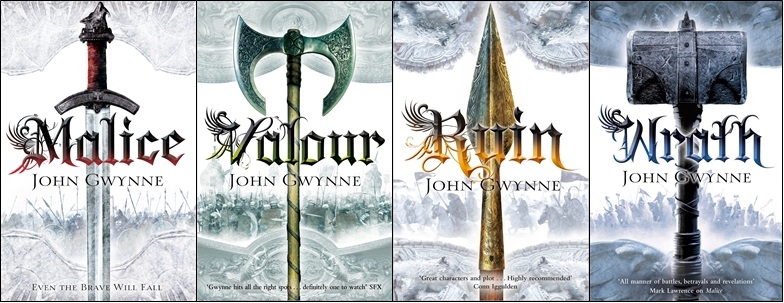Author Spotlight: John Gwynne
John Gwynne is the author of the epic fantasy series The Faithful and the Fallen, including Malice, Valour, Ruin and Wrath. The series has received multiple Gemmell Award nominations. John’s latest fantasy series, Of Blood and Bone, began earlier this year with A Time of Dread.
John studied and lectured at Brighton University. He’s been in a rock ‘n’ roll band, playing the double bass, travelled the USA and lived in Canada for a time. He is married with four children and lives in Eastbourne running a small family business rejuvenating vintage furniture.
You can follow John on twitter @JohnGwynne_
Thanks for joining us today, John. Let’s start small: tell us about a great book you’ve read recently!
Okay, the last book I read was The Whale Road by Robert Low. It’s a great Viking adventure romp, following a young man who joins a mercenary band, the Oathsworn, who become embroiled in a hunt for the grave of Attila the Hun and the Spear of Destiny. It’s a cracking read, a bloody, brutal page turner that I’d highly recommend.
Okay, time to escalate things: reality warps and you suddenly find yourself leading a D&D-style party through a monster-infested dungeon. What character class are you, and what’s your weapon of choice?
Blimey, somehow I missed the whole D&D craze, so I’m googling this one.
Right, some awesomely cool options there.
I’m going to go with Barbarian, because they look good with a Dane-Axe, and being a Viking re-enactor that would of course be my weapon of choice.
Also, I grew up on Robert E. Howard’s Conan the Barbarian, so, more coolness. And one of my favourite video games was Severance, and I was always the Barbarian in that.
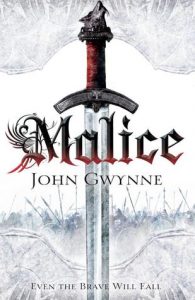 When you’re not trawling through dungeons, do you prefer to type or to hand-write?
When you’re not trawling through dungeons, do you prefer to type or to hand-write?
I wrote my first book, Malice, by hand, and then typed it up during my first edit – this was between the years of 2002 and 2010. Since then I’ve shifted onto typing everything except my story and chapter notes.
Why?
Because, deadlines.
After I’d written Malice my publishing deal with Pan Macmillan came along, and I just didn’t physically have the time to hand-write the first draft and then type the manuscript up.
I thought it was time I stopped being an old-fashioned idiot and joined the 21st Century.
And how do you like to work – in silence, with music, or serenaded by the souls of a thousand dead shrimps?
Music, always.
My household is a wonderful place, always full of people, dogs and noise. I like to think of it as a charming chaos. But that’s not great to write in – not for me, anyway. So, headphones and a playlist are my go-to device for getting in the zone to write. Usually soundtracks or playlists put together from soundtracks – Lord of the Rings, Braveheart, Gladiator, The Last of the Mohicans, Dracula, Conan the Barbarian, Macbeth, a load more – as well as some more obscure stuff like Celtic and Norse folk music. Have a listen to Wardrunna or Danaheim for some serious Norse atmosphere.
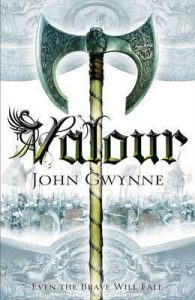 Are you an architect or a gardener? A plotter or a pantser? D’you write in your underwear, or in a deep-sea diver’s suit? Tell us something unusual about your writing method!
Are you an architect or a gardener? A plotter or a pantser? D’you write in your underwear, or in a deep-sea diver’s suit? Tell us something unusual about your writing method!
I’m somewhere in the middle of architect and gardener. I like to have an idea of the beginning and end of my book, as well as a string of key events in between, and then I let the POVs out of their starting blocks and see where they end up. For some characters and their journeys, I have a fairly clear idea how it’s going to go, and they follow the plan, others deviate in ways I’d never imagined. Some even go and get themselves killed when I originally thought they were going to make it past the finishing line.
It can be a bit like Bilbo’s famous words – ‘It’s a dangerous business, Frodo my lad, stepping outside your front door…’
More often than not when I’m writing I’m found with a Viking vambrace on my forearm. My wife and sons have occasionally walked in on me to find me waving a seax around – basically a big Viking knife. What can I say.
What are your most significant non-book fantasy influences?
Films, mostly, but they’re not usually fantasy, apart from the Lord of the Rings movies, which felt like my childhood being captured and shown on the big screen. That was a wonderful moment, hearing the music and seeing the Fellowship of the Ring title appearing on a cinema screen.
Sorry, I’m straying from the question.
Non-book influences: Films like Braveheart, Last of the Mohicans, Gladiator. And more recently The Revenant. I love that film. The opening battle scene in the Revenant is the closest visual I’ve seen to how I imagine my battle scenes in my head. I’m not sure if they come out as frantic and visceral as the Revenant, but that’s my goal.
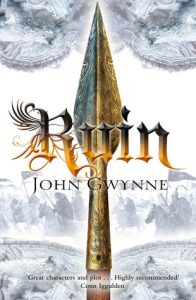 What was the last thing you watched on TV and why did you choose to watch it?
What was the last thing you watched on TV and why did you choose to watch it?
I binge-watched the last series of Peaky Blinders. It was after I’d had a pretty full-on intense time finishing the first draft of A Time of Blood, book two of my new series, so I felt like I’d earned some couch-slobbing time.
My wife and I just love Peaky Blinders. We’re into all things vintage and historical, and how can you not love a bit of Godfather-Gangsterism. (Okay, I know that’s not a real word.)
The world shifts, and you find yourself with an extra day on your hands during which you’re not allowed to write or otherwise do any work. How do you choose to spend the day?
I actually don’t know. I can’t remember the last time I wasn’t busy with too much to do. Drag my family to a castle? I realised the other day that I’ve never been to the Tower of London. That would be cool.
Or, alternatively, I could sit still. Read. Listen to some cool music. Eat ice-cream. Play Rome Total War.
I like both options.
If you could choose one punctuation mark to be made illegal, which would it be and why?
I’m going to point the finger at two. The semi-colon and the ellipsis. Apparently, I had a semi-colon and ellipsis obsession littering my first draft of Malice. I had to take them all out, and then go through withdrawal every single time I wanted to use them.
I do use them now, but in moderation, as I’ve learned to curb my excesses.
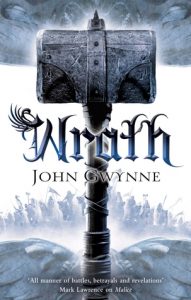 In no more than three sentences, tell us a little something about your current work in progress!
In no more than three sentences, tell us a little something about your current work in progress!
I’m about to start the third and final book of my new trilogy, Of Blood and Bone. It’s THE BIG ENDING, so will hopefully have a load of stuff that makes it epic – battles, shieldwalls, giant bears, armies of angels and demons, blood-sucking Revenants, limb-tearing Ferals, demonic experiments, a snake-woman and warriors bound by love, friendship and oaths. And did I say insanely-skilled horse-riding archers.
And shieldwalls.
If you could co-write or co-create a series (like The Expanse, or the Malazan Book of the Fallen), who would you choose to work with and why?
Bernard Cornwell, because I’ve loved everything he’s ever written, and how better to learn than to work with a Master. Plus, it would be awesomely cool – if I managed to get past the stage of being incapable of speech.
What’s the most (and/or least) helpful piece of writing advice you’ve ever received?
Well, I haven’t had a barrel-load of writing advice. When I started working on Malice I wasn’t on Facebook, Twitter didn’t exist and there was very little to compare to the strong, supportive internet community that you see today. I hadn’t done a course in creative writing and I didn’t belong to a writers group or any kind of support network. Back then writing was fairly insular for me.
There was one piece of advice that I took on board, though. It wasn’t from someone talking specifically about writing a novel, but it was relevant.
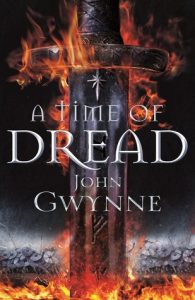 Back in 2002 when I first decided to have a go at writing as a hobby, I very quickly realised that I didn’t have a clue about how to actually write a book. I fell back on the only way I knew how to write – how I’d been taught at University. I had a fantastic teacher and tutor called Udo Merkel, and he always said to pass my degree I must read, read, and then read some more. He was talking about research, and that’s something I took on board most seriously. Maybe too seriously, as I spent the bulk of the next four years reading a pile of the cool stuff – Celtic, Norse, Greco-Roman mythologies, ancient history, wolf-pack behaviour, how they made swords two thousand years ago, cycles of the moon, Gaelic, all kinds of wonderful stuff, and every time that something sparked my imagination or excited me I wrote it down. It’s all gone into the pot that turned out The Faithful and the Fallen.
Back in 2002 when I first decided to have a go at writing as a hobby, I very quickly realised that I didn’t have a clue about how to actually write a book. I fell back on the only way I knew how to write – how I’d been taught at University. I had a fantastic teacher and tutor called Udo Merkel, and he always said to pass my degree I must read, read, and then read some more. He was talking about research, and that’s something I took on board most seriously. Maybe too seriously, as I spent the bulk of the next four years reading a pile of the cool stuff – Celtic, Norse, Greco-Roman mythologies, ancient history, wolf-pack behaviour, how they made swords two thousand years ago, cycles of the moon, Gaelic, all kinds of wonderful stuff, and every time that something sparked my imagination or excited me I wrote it down. It’s all gone into the pot that turned out The Faithful and the Fallen.
If you could visit any country at any point in history, where/when would you go, and why?
Dark-Ages Briton, fifth/sixth century. Because…Arthur. Did he exist? What actually happened at the Battle of Badon? I’d love to know.
I wouldn’t want to stay too long, though – no central heating, no antibiotics, no Haagen-Daz.
Every writer encounters stumbling blocks, be it a difficult chapter, challenging subject matter or just starting a new project. How do you motivate yourself on days when you don’t want to write?
I don’t really suffer with stumbling blocks or lack of motivation. I love writing. If anything, my biggest problem is finding the time to write. Even when I’m in ‘work-mode’ emails, messages and social media ‘stuff’ is a real time-stealer for me. I can also be prone to serious bouts of procrastination – turning the internet off helps with that. Once I’m sitting at my desk, headphones on, then writing isn’t usually a problem. I can be slower at the beginning of a book and build up momentum as I go, but I don’t really hit stumbling blocks or lack of motivation.
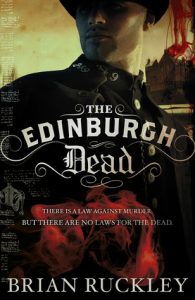 Tell us about a book that’s excellent, but underappreciated or obscure.
Tell us about a book that’s excellent, but underappreciated or obscure.
The Edinburgh Dead by Brian Ruckley. I’ve been a big fan of Brian Ruckley’s since his debut, Winterbirth. I wouldn’t exactly say he was obscure, but I love his writing and don’t think he’s had the recognition that he deserves.
The Edinburgh Dead is a kind of Gothic/horror/fantasy mash-up. It’s set in Edinburgh (surprise) in the 1820’s and taps into the Burke and Hare body-snatching drama, but with added necromancers and re-animated people – among other things. It’s a tense, atmospheric piece that had some genuinely scary moments. It reminds me of the first and best series of Penny Dreadful. Brian writes well-drawn characters that I empathised with, and he has a keen eye for detail, tension and conflict. I’d recommend this to any fan of fantasy.
Finally, would you be so kind as to dazzle us with what we like to call a ‘shark elevator pitch’? (It’s exactly the same as an elevator pitch, but with sharks.) (Well, one shark. Which, by the way, is currently picking between its rows of teeth to try and dislodge the remains of the last author who stepped onto its elevator.)
Ahem. So: why should readers check out your work? A shark elevator pitch of your own book(s) in no more than three sentences – go!
Okay, I’m rubbish at this. I can write a book, but don’t ask me to write about my books. Here we go.
I write epic fantasy, and by that, I mean a world with sweeping vistas and fantastical, rather unpleasant and usually dangerous creatures. I strive to make the characters the heart of my stories, whether they be heroes or villains – although most of them don’t know what camp they fall into at the beginning of my books. Both my series are tales of love, friendship, family and betrayal, and shieldwalls. Epic and intimate is my writing mantra, the goal I strive for.
How was that? Sorry it was four sentences, but I write epic fantasy so what did you expect?
No worries, John. That was perfect. Thanks for joining us today!
Thanks for having me on the Fantasy Hive. It’s been a real pleasure and you guys are awesome.
John Gwynne is the author of epic fantasy series The Faithful and the Fallen and Of Blood and Bone.
